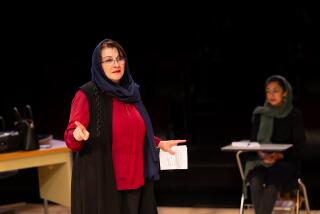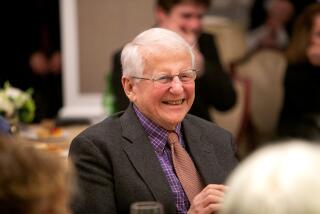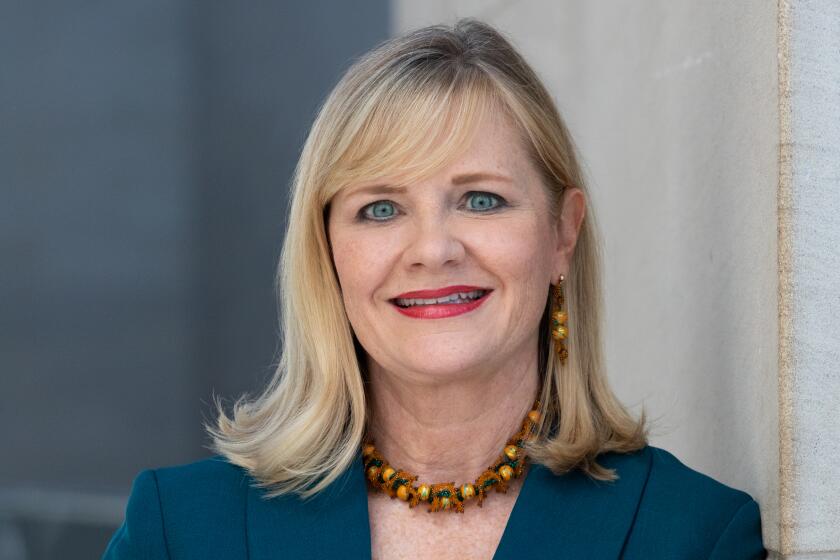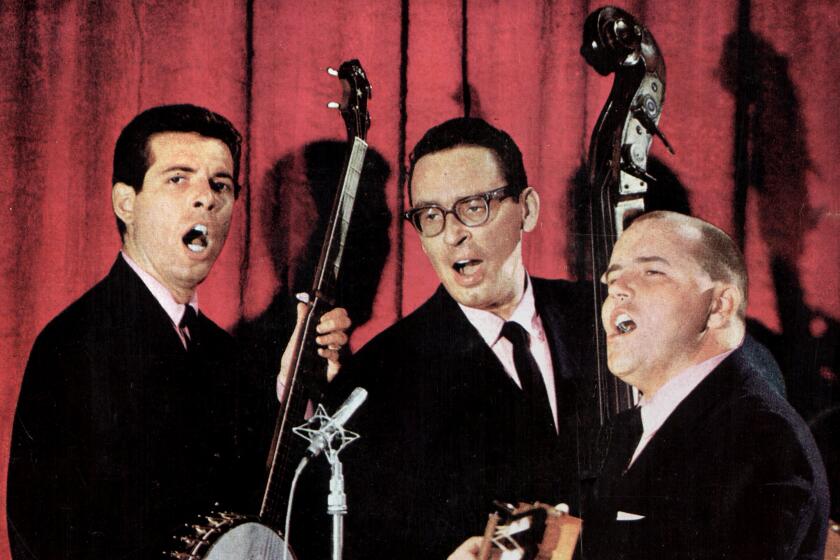Irishman Enda Walsh doesn’t let words get in the way
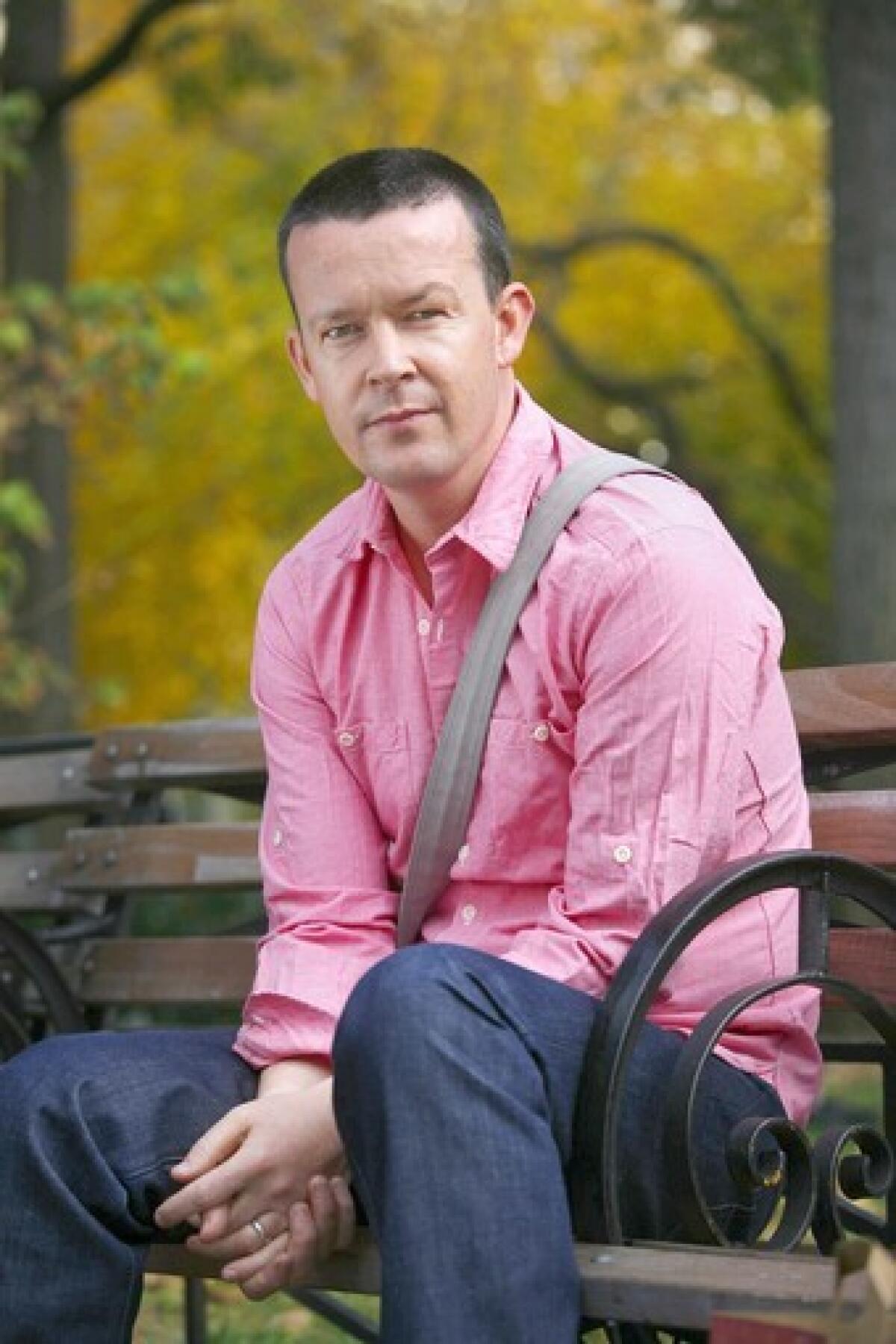
For a writer, Enda Walsh has surprisingly little faith in words.
The 42-year old Irish dramatist’s plays “The Walworth Farce” and “The New Electric Ballroom” have earned rave reviews on both sides of the Atlantic. But he insists that “words sort of get in the way sometimes.”
When challenged on this issue, Walsh points to an experience he had in Italy: “I had a play called ‘Bedbound’ that I directed in Italian before I directed it in English.” Walsh adds that he doesn’t speak Italian -- nor did the cast speak any English.
“I had a translator for three days, but then I got rid of her because I didn’t need her,” he says, “I knew the play, they knew the play, and it was about finding the rhythm of it. We all knew the scenes, and I knew emotionally what they were trying to get at. It was a very funny experience.”
“The Walworth Farce” opens Wednesday at UCLA Live, and “The New Electric Ballroom” comes to Westwood in December. The Dublin-born playwright -- called “the most explosively brilliant of modern Irish stage poets” by the Scotsman newspaper in Edinburgh last year -- spoke about his work near New York’s Union Square, where he is staying during the U.S. premiere of “The New Electric Ballroom” at St. Ann’s Warehouse,
It is clear that Walsh isn’t diminishing the importance of words, but rather making a point: that theater can be much more than just people talking. “In these two plays,” Walsh says, “the lines are only about 25 to 30% of the piece.” The remaining 75%, he feels, is what the actors and director bring out of the material on stage.
This speaks to Walsh’s belief that theater is written onstage, not just in a writer’s head -- a belief that emerged during his years in Cork, Ireland. Walsh wound up there at age 23 after finding the Dublin theater scene small and insular. He heard of a new theater company in Cork, named Corcadorca, and went there, quickly joining it. .
“We were living on Guinness and crisps. We were in poverty, but that was the whole deal. We just really wanted to make theater, so we used to make new theater every week,” Walsh recalls. “There was a core group of eight or 10 of us. I was the designated writer on the basis that I liked spending time by myself more than the others.”
Walsh looks back fondly at this time -- but admits that most of the theater they created was awful: “I used to get in front of the audience at the end of our performances and go, ‘OK, that was a terrible, terrible piece of theater you just had to watch. But why was it terrible?’ I was very up-front and brave about it. I figured, I don’t know anything about theater, and I need to actually learn about it -- and what better way to learn about it than asking the audience why it’s not working for them.”
This process eventually led to the creation of a play titled “ Disco Pigs,” a bleak two-hander about the fragile bonds of teenage friendship, which became a hit in Edinburgh and toured Europe. (It didn’t travel to the States, though a 2001 film version staring Cillian Murphy -- who was in the original stage production -- is available on DVD). After “Disco Pigs,” his collaboration with Corcadorca had run its course. Walsh then moved to London and got married to magazine editor Jo Ellison.
Immigrant play
It was at this time that Walsh was mulling ideas that would become “The Walworth Farce,” a dark play about an Irish father who brings his sons to London and forces them to perform the family’s history as a play each day in the living room of their tiny flat. Part of the inspiration for “The Walworth Farce” was Walsh’s reaction to one popular genre of Irish theater: the immigrant play. “They’re so many of these plays, and they’re all set in pubs, with Irish builders in England and they’re all sitting around getting drunk and thinking about home and stuff like that. Dreadful, mawkish, sort of romantic mythologizing things,” Walsh rants, “It’s like Martin McDonough without the . . . gags.”
Another element in the creation of “The Walworth Farce” was more personal: “When ‘Disco Pigs’ was in the West End. . . . I was getting the beginnings of obsessive compulsive disorder.” Walsh found that he started organizing his schedule so that everything would happen each day at the same time.
“I would leave my flat and walk down the road at exactly 9:15 and each day I would look into a house and see this father and mother and a son always standing in the same position,” Walsh says.
“I could see there was Irish stuff on the wall, that they were an Irish family. But I was fascinated that they were always there. . . . They were always doing the same thing, I was doing the same thing, and the world continued and had seconds in it and minutes and hours, and everything had some sort of pattern to it. That moment -- seeing them -- really, really influenced ‘The Walworth Farce’ in terms of characters who need to exist in a very structured way.”
Walsh took these ideas to a German friend, Tilman Raabke, a dramaturge in Oberhausen. They spent two days talking through these ideas, then Walsh banged out the play in about a month. It was later in the writing process that Walsh introduced the element of farce and the notion of the father trapping the sons, forcing them to perform.
But “The Walworth Farce” really didn’t come into focus for Walsh until well after the work’s premiere.
“We opened it in Galway [at the Druid Theatre Company] . . . and [director] Mikel Murfi did an amazing job of putting it on,” Walsh says, “but it wasn’t really working as a piece. And then we had a cast member who changed before we went to Edinburgh, and the actor that we re-cast found the play for us.” The play went on to win a Fringe First award in Edinburgh that year; and the actor, Tadhg Murphy, has stayed with the show and performs on this tour.
“He really made the piece work for us, because he sort of grounded it, in a real place, he made the love story between him and the Tesco girl” -- a clerk at a U.K. supermarket chain -- “work. And then it became this piece about love -- misplaced love . . . suddenly that story sort of opened up to us, and we thought, ‘OK, that’s interesting,’ if we can tap an audience into that, then the madness and chaos they’ll allow.”
Directing his play
This same collaborative process went on with Walsh’s next play “New Electric Ballroom.” An idea in the playwright’s mind (“I just had that image of older women dressed in 1950s gear with a big light on them”), a session with Raabke, a month of writing and then a great deal of finding the play in rehearsal -- with one change: This time, Walsh was the director.
Murfi, the director of “The Walworth Farce,” acts in “Ballroom” (playing the fishmonger, Patsy), which helped Walsh, who prefers writing to directing: “I don’t think I’m a director. I don’t feel comfortable in the rehearsal room. I think my involvement in the play is done when I finish writing it. That’s enough for me usually.”
Then why did he choose to direct it? “I really, really connected with the play -- and with the central character, Ada. “
While writing these two plays -- not to mention, tinkering and touring with the Druid productions -- Walsh also co-wrote the screenplay for the film “Hunger,” which won the Caméra d’Or award at last year’s Cannes Film Festival. Walsh was teamed with artist Steve McQueen, who wanted to make a film about IRA hunger striker Bobby Sands. “We did a lot of research for the project, but while we were researching ‘the stuff,’ I was researching him,” Walsh says. “I was going ‘Who is Steve McQueen?’ What is his sensibility? How do I create this script and place it in his belly, so it feels authored by him. That’s my job.”
Walsh enjoys writing screenplays but has no plans to stop writing for the stage. “I love when you see producers come up and go, ‘Do you think there’s a film in there?’ and you think, ‘What are you . . . talking about?’ Like every story needs to be a film,” he rants, making it clear that he’s not worrying about “The Walworth Farce” being optioned for a studio movie, “No! It’s just pure . . . theater -- that’s all it is. It’s for the stage and it needs that animal thing that theater can have.”
Walsh’s next play is a retelling of the story of Penelope and her suitors from Homer’s “The Odyssey.” Walsh says he’s finished writing and excited about it, but insists that he won’t know what it’s really about until he sees it on stage: “I have to trust that from the experience I’ve had, that it will be there -- that it will be strong enough or be true enough and that I won’t feel like Enda Walsh the person has been all over it. It will be there when it feels that it’s been powered from the stage -- really written from the stage.”
More to Read
The biggest entertainment stories
Get our big stories about Hollywood, film, television, music, arts, culture and more right in your inbox as soon as they publish.
You may occasionally receive promotional content from the Los Angeles Times.
